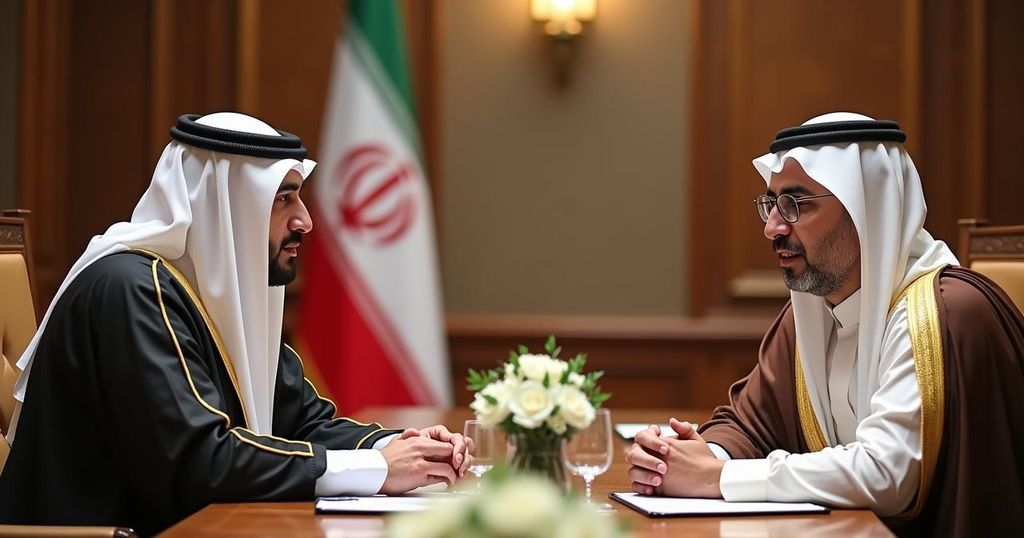Iranian Foreign Minister Engages in Diplomatic Talks with Houthi Official in Oman

The Iranian Foreign Minister Abbas Araghchi met with Houthi official Mohammed Abdelsalam in Muscat, Oman, amid escalating tensions in the Middle East and Israel’s threats of retaliation against Iran. This meeting is part of Araghchi’s broader diplomatic tour aimed at addressing conflicts in Lebanon and Gaza, encouraging a cease-fire, and reinforcing diplomatic channels in the region. Despite Iran’s military preparedness, it seeks to pursue peace and stability.
On Monday, Iranian Foreign Minister Abbas Araghchi conducted a meeting in Muscat with Mohammed Abdelsalam, a senior official of the Iran-backed Houthi movement, signifying a pivotal moment in Iran’s extensive diplomatic endeavors across the Middle East. The Iranian Foreign Ministry shared images of the discussions with Abdelsalam, who serves as the spokesperson and chief negotiator for the Yemen National Salvation Government, highlighting the importance of the consultations as Araghchi engages with regional allies in light of Israel’s threats of retaliation following a recent missile assault attributed to Iran. In conjunction with the meeting with the Houthi representative, Araghchi also conferred with Oman’s Foreign Minister Sayyid Badr al-Busaidi, during which they addressed ongoing developments involving Lebanon and the Gaza Strip, where Israel is currently in conflict with militant groups, including Hezbollah and Hamas. Both parties condemned what they termed the “genocide and aggression” perpetrated by the Israeli regime in Gaza and Lebanon, urging an immediate cessation of hostilities. Iran’s aggressive military posture is evidenced by the firing of nearly 200 missiles at Israel on October 1, a move characterized by Tehran as retaliation for the targeting of its aligned militant leaders. The Israeli response to these provocations remains a matter of heightened concern. The meeting with Mohamed Abdelsalam marks another step in a series of diplomatic activities for Araghchi, who recently visited Baghdad, Qatar, and Saudi Arabia, focusing predominantly on efforts to establish a cease-fire in Lebanon and Gaza, as well as strategies to contain the escalating conflict’s reach across the region. Araghchi reiterated Iran’s stance on warfare, stating that the nation is “fully prepared for a war situation… but we do not want war, we want peace.” Thus, Iran continues to navigate a complex landscape of regional alliances and conflicts.
The backdrop of this diplomatic engagement revolves around the ongoing tensions in the Middle East, particularly the hostilities between Israel and various Iranian-backed militant factions, including the Houthis in Yemen, Hezbollah in Lebanon, and Hamas in Gaza. Iran’s recent missile attacks against Israel were framed as retaliation for the targeted killings of its allied forces, escalating the regional conflict. The continuous dialogue among Iranian officials and their allies is aimed at aligning strategies and mitigating further military escalation, particularly as the international community closely monitors these developments amidst fears of a broader confrontation in the region.
In conclusion, the meeting between Iranian Foreign Minister Abbas Araghchi and Houthi official Mohammed Abdelsalam exemplifies Iran’s strategic efforts to engage in diplomatic discussions amid regional hostilities. The Iranian government emphasizes a commitment to peace while simultaneously preparing for military contingencies, further underscoring the complexities of Middle Eastern geopolitics. The collaborative stance taken by Iran and Oman highlights the significance of diplomacy in addressing ongoing conflicts, although the specter of war looms due to the volatile situation surrounding Israel and its adversaries.
Original Source: www.voanews.com








